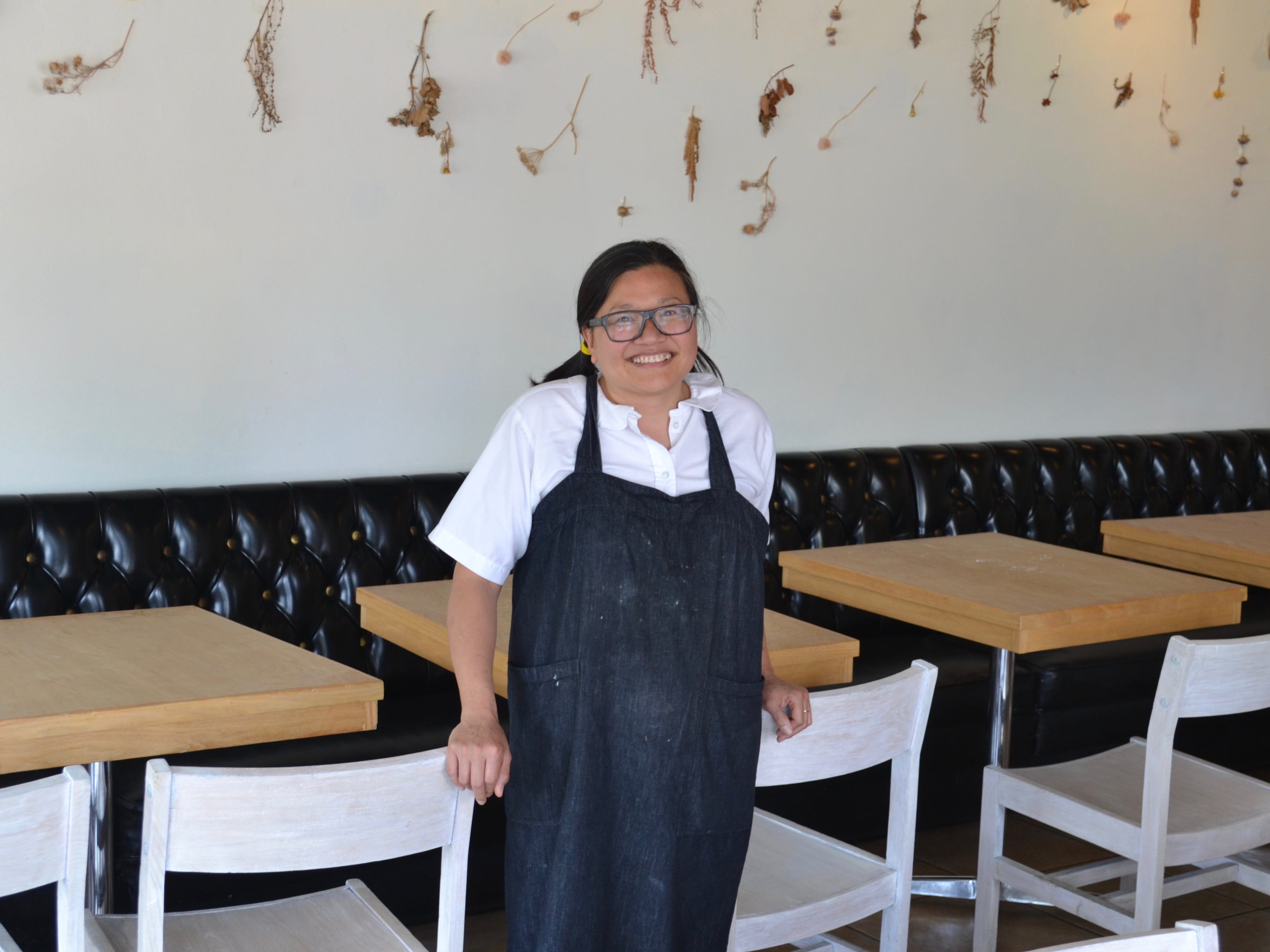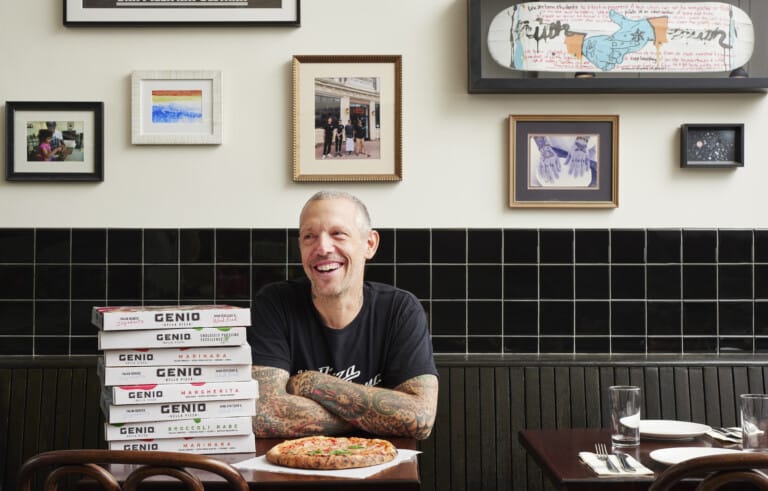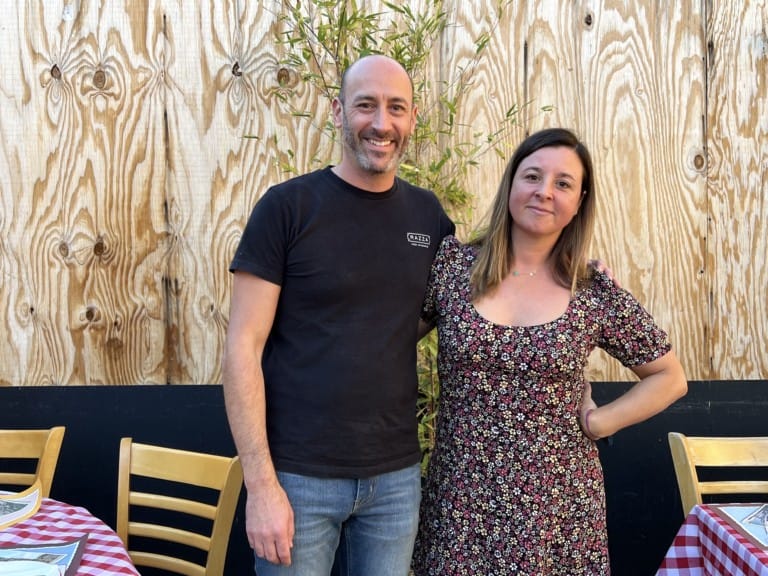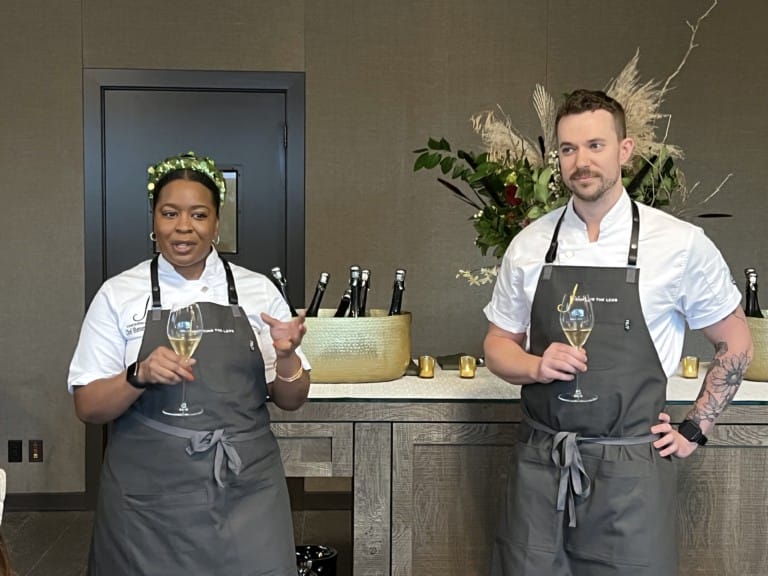Chef Minh Phan is leading a new wave of highly personal Historic Filipinotown restaurants at Porridge + Puffs. Her seasonal restaurant builds on lessons learned at California School of Culinary Arts and at farm-to-table establishments like Axe in Venice, Inn of the Seventh Ray in Topanga Canyon and SPQR in San Francisco. Phan worked as an executive chef at Beachwood Cafe in the Hollywood Hills and at Gaji in DTLA before following a more entrepreneurial path. She channeled her culinary skills, personal beliefs and convictions to launch Porridge + Puffs, first as a Hollywood pop-up and now as a more fully realized, multi-faceted version in HiFi. I recently sat down with Phan at her restaurant after the lunch rush subsided, and we explored topics ranging from staffing to sustainability and the struggle to achieve proper value.
Joshua Lurie: Any surprises, good or bad, about running Porridge + Puffs in this current iteration?
Minh Phan: It’s still really hard. Six months in, I was pretty sad, I think because of staffing. I never thought I was going to get my dream team. [Enter Traci Matsumoto holding a salad.] This is my dream team! This is Traci.
That’s the biggest disappointment and best surprise. Staffing is super hard.
JL: What can you do about staffing, and what do you feel like the key is?
MP: It’s so hard that you give up. Just like finding the right partner in life. They just magically come. Not even putting intentions out there, it just came. Traci’s kind of a magical story. I nearly gave up, and I thought it was me. “God, I must be a horrible boss.” I went through four sous chefs, people of color, women of color. I really wanted to build this inclusive team of women of color, LGBTQ, super under-represented group to have a voice and be a great and total and thoughtful kitchen. We’re the anti “Oui chef” kitchen. All the work without the ego and the centralized narcissism. That was something I really tried to work on. “Did I not deliver? Is this why people don’t want to work here?” I just realized that my expectations were super high. At first I was like, “I’m just going to hire people that want to work, and work really hard. They don’t have to have a lot of experience because I can train people.” That didn’t work. That was a big failure. I chose people from non-profits who I loved as human beings. “We hang out and I love you. We can hang out all day.” The restaurant world beats you up. Because I was always in it, I didn’t know how hard it is for others. I burnt them out and then it made me seem like a horrible human being.
JL: You felt that way?
MP: It made me think twice, because when you open a restaurant you work 12-16 hours, and you don’t blink an eye, but you can’t ask that of your people. People who are on salary. That’s what it is. When I was a sous chef, I’d end up making $4 per hour. I’m so cognizant that I was counting their hours and watched how much they were making per hour, even after working all these hours, but it wasn’t enough for people who don’t come from this world. We did the numbers and the only way for this to work is to do a big volume and do everything in bulk. That didn’t work because the quality went down a lot in my eyes. I’m so used to doing everything small, small, small.
JL: Did you notice, or did other people notice?
MP: I don’t know if others did. I definitely did. I was always upset, and I couldn’t waste food, so I was always in this in-between.
JL: What adjustments did you make in response to these realizations?
MP: I kind of let go a lot. When I opened the restaurant, I thought, “You know what, if I’m at 80% of what my vision is, I’m happy.” I’ve done this for a long time. You envision something, and if one thing doesn’t get salted out of 20 things, I’m okay. I’m not going to lose my shit…With every single one of our customers, I taste all the dishes, but I just kind of let go. “You know what, maybe I’ll just be at 60% and I have to live with that.” How do I chef-proof our recipes? You can’t because our ingredients change every day. No one understands that. One of our sous chefs – I’m not going to say who – said, “Can you put everything on an app? I’ll go buy that app.” No, I don’t think that’s the type of restaurant I want to build. I want to have a place where people touch things and taste everything, because the ingredients change.
JL: That model is inherently challenging.
MP: On our menu, we just put cover-crop beans. We don’t have the same beans every day. It’s whatever type of beans GrowGood or Tutti Frutti Farms use as a cover crop. “We’re going to give it to you, instead of $50 a box, it’s going to be $40.” Great, because they have a lot of it, and it’s just very environmental. We have to make a lot of adjustments as cooks. They’re sweeter sometimes, and sometimes they’re bland and mealy, and you need to pickle them. You can’t just put on the menu as it is. We’re very general and not very specific in our techniques and our menu, and that’s a challenge in itself.
JL: Very fluid.
MP: Very fluid, non-committal. Committed to the environment and to our ingredients, but not committed to the constant, which I think is really hard for customers to understand and very hard for staff to understand. It makes them crazy.
Connie [Sum] has been with me since almost day one, and she’s magical and she’s been holding it up. [Naomi Wainwright is also a key part of the Porridge + Puffs back of house team.]
Traci came in from Russ [Moore] and Allison [Hopelain], who had Camino [in Oakland], which closed. They sent Traci down. They bought her a gift certificate and emailed me and said, “We’re sending down our chef,” and didn’t tell me anything. “We want you to meet her.” They didn’t tell her anything. We met and fell in love with each other. I didn’t know she was looking for a job, didn’t know she was moving back to L.A. Allison and Russ orchestrated this thing where, “She’s going to love it here. You’re going to love her. We have faith.” It magically all worked out.
JL: Is Traci from L.A.?
‘
MP: Her family grew up in L.A. She’s been away from L.A. for almost two decades. She’s one of those people who started culinary school – almost skipped high school – she knew she wanted to do it.
She moved back from the Bay Area. A lot in her life was changing, being back in L.A., and she was magical. “Oh, my god, you gave me faith in humanity and the restaurant.” She comes from “Oui chef” kitchens. She was the sous chef at Terra and has always worked in fine dining. She worked in the Napa Valley and Bay Area. She understands California cuisine. People talk about that like it’s a new thing. Where have you been?! She gets it and is the most amazing gift I’ve ever been given at this restaurant. That was the biggest surprise. Until she came along, that was the hardest thing for me. Building a team was really hard.
JL: Where are you at now?
MP: I’m so happy. I just think my team is magical. Eventually I’m going to have growing pains. We’re going to grow and have to do another round of staffing. Right now, there are four of us, and that’s all shifts, all the time.
JL: You’re going to grow by adding service?
MP: Adding services. That’s why we have really specific services, because I’m really controlling and want all the services to be really great, but we have to grow. We can’t just be open five days a week, and three dinners per night. It’s really wonderful, but financially, it just doesn’t make sense. We needed to do that for the quality to be where I wanted it to be. And we really are in a funky place that people don’t understand. Casual, but we’re not fine dining. We want to be warm and thoughtful, but we don’t want fussiness and we don’t want people sleeping on the floor. We can’t afford more, but our servers are really well-trained.
I went to a fine dining restaurant and it was our third time there in an eight-month period and they didn’t remember us. You know what, when somebody comes to our restaurant for the second time on a reservation, we remember, and we remember what they had.
JL: Attention to detail.
MP: We have the same level of attention to detail and thoughtfulness as a fine dining restaurant, but then our stuff is $6-12. In a weird way, it’s unsustainable, but at the same time, I wouldn’t do it any other way because that’s why I opened a restaurant. We have to find that sweet spot.
JL: How do you define sustainability?









Leave a Comment